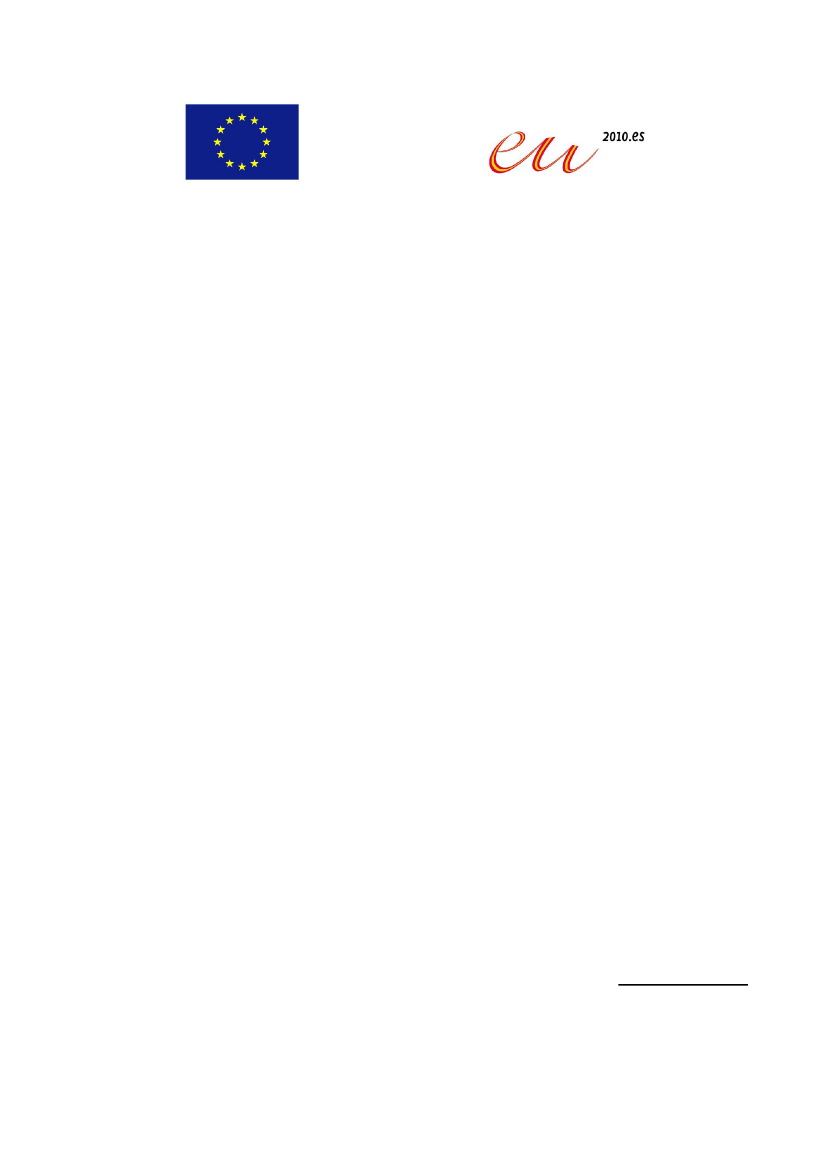Sundhedsudvalget 2009-10
SUU Alm.del
Offentligt
Delegation of the European Union
Permanent Representation of Spain
WHOExecutive Board126th Session(Geneva, 18 - 23 January 2010)
Statement byDr M. Kökény, Hungaryon behalf of the European Union
"Report by the Director General"(agenda item 2)
Geneva, 18 January 2010
Check against delivery
Geneva, 18 January 2010
WHOExecutive Board126th Session(Geneva, 18 - 23 January 2010)EU Statement"Report by the Director General"(agenda item 2)
Thank you, Mr/Ms Chair.I have the honour to speak on behalf of the European Union.To begin with, the European Union would like to take this opportunity to express itsdeep sympathy to the people of Haiti affected by the enormous tragedy of 12 January.We would like to extend to them our deep condolences and send words of support inthese times. EU would also like to share compassion with UN workers in Haiti alsoafflicted by the earthquake. We all should manifest a common solidarity and we shouldspare no efforts of the international community aimed at improving the well-being andhealth situation of those in need.We are facing up to an agenda full of prominent global health issues, and it is achallenge to address them all in one week. Nevertheless, it also gives us the opportunityto respond to issues that have a direct impact on the welfare and health of our citizens.We would like to thank the Director-General for her report, which reflects thechallenges that the Organization and all its Member States are facing in the field ofhealth, and ways to move forward in several areas.The European Union is ready to collaborate constructively with the WHO.First of all, the EU would like to thank the Secretariat for the Pandemic InfluenzaPreparedness Report: sharing of influenza viruses and access to vaccines and otherbenefits. The EU actively participated in its preparatory meetings. The EU appreciatesthe efforts and leadership of the Director-General and the Secretariat, and encouragesthem to continue working together with stakeholders involved in this process to takeforward the non-agreed parts of the Pandemic Influenza Preparedness Framework.Communication between national focal points and WHO IHR contact points accordingto the International Health Regulations has worked as an effective channel forinformation exchange and dissemination. Regulations have proved to be an adequatelegal framework to guide the response to influenza pandemic, and its EmergencyCommittee provides an important tool to the Director General. The EU emphasises theimportance to continue establishing alliances with other international andintergovernmental bodies, especially with those who play an active role in the transportsector.
2
The EU highly appreciates the extraordinary efforts and competent globalleadership of WHO from the outset of the H1N1 pandemic outbreak. Weunderstand that WHO is already considering to initiate an independent evaluationof the organisation’s handling of the pandemic. We welcome such an evaluation,since it would be a significant step to make use of experiences and to improve thepreparedness for future pandemics.EU countries support the leadership of WHO in the monitoring of the achievement ofthe health-related MDGs in the High Level Event on the MDGs to be held in New Yorkon September 2010.The WHO Regional Office for Europe and its member countries have beenaddressing this matter by initiatives aiming at strengthening national healthsystems towards universal access to primary health care and the adequatefinancing mechanisms in order to ensure social health protection.As for the international recruitment of health personnel, we would like to emphasize ourinterest in improving the performance of data gathering, processing and monitoringsystems on health personnel, necessary to formulate policies based on objectiveinformation. To this end, the role of the WHO is critical to support Member States andto work to provide a solid framework to the voluntary code of good practice, taking intoaccount that in the EU there are source countries and destination countries alike, as wellas other countries encompassing both categories. The establishment of sustainableworkforce policies in health care will be a major challenge for all WHO Member Statesfor the next decades.As regards food safety, the EU continues to support global initiatives promoted byWHO in this area. However, these actions should cover the entire food chain. Inaddition, the EU stresses the importance WHO’s to cooperate proactively (AT) with theCODEX Alimentarius Commission and the significant role of nutrition in thedevelopment of noncommunicable diseases.With respect to the implementation of the global strategy for the prevention and controlof noncommunicable diseases, the EU, in collaboration with the European RegionCountries, underlines the leading role of the WHO in realizing the comprehensive workon noncommunicable diseases, in monitoring, prevention, control and research in thisfield, and in the use of social determinants of health. This is increasingly relevant for thedeveloping countries. The EU notes that the 7thInternational Conference on HealthPromotion held in Nairobi put forward a strong document, a Call to Action. The EUproposes to WHO the implementation of the key recommendations of it.The EU welcomes the WHO report on Strategies to reduce the harmful use of alcohol asa means to lower the burden of noncommunicable diseases, respecting the differentcontexts and traditions of Member States.Regarding the report of the Secretariat on availability, safety and quality of bloodproducts, the EU believes that it is important that WHO should assist countries tostrengthen their health systems in order to improve the competence of NationalRegulatory Authorities and National Control Laboratories for the manufacturing of
3
plasma and blood-derived products, in accordance with internationally recognisedregulatory standards.As for the international chemicals management, the EU supports the proposals made bythe Secretariat, which are consistent with the guidelines followed by the EuropeanUnion.Health consequences of climate change, are well known, and the EU encourages WHOto continue to make efforts to highlight the consequences of climate change for publichealth on the international agendas.The EU welcomes the reinforced efforts of the DG to discuss current challenges withregard to financing and governance of WHO – a discussion that is closely linked to theglobal health architecture of today. We remain deeply committed to maintaining andreinforcing the relevance and capacity of WHO as the world’s leading global healthactor. In this regard, it seems to be crucial to strengthen the governance and centralfinancial management of WHO. The EU is looking forward to participating in the workconcerning the WHO Programme Budget for 2012-2013 where these important issueswill play out.We would also like to underline that the EU is looking forward to closely follow theestablishment and the work of the Independent Expert Oversight Advisory Committee.We hope that this Committee will prove to be a highly useful and efficient tool aimingat reinforcing the accountability of WHO.Finally, the EU acknowledges the WHO's contribution towards the UN reform processand "Delivering as One" and encourages the Director General to continue to showleadership within the UN family to improve efficiency and effectiveness"
Thank you Mr/Ms Chair.
_____________
4




